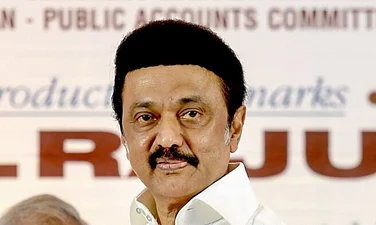Barely four months after the flower of Indias youth was sacrificed at Kargil, the home minister has declared that India is a soft state. Within days, this notion has acquired the status of a demoralising dogma in what passes for national political discourse. As usual, there has been little effort to understand the original concept or the context in which it was first applied by Gunnar Myrdal. It is simply repeated endlessly till it appropriates the outward attributes of an absolute truth.
We are also being told that the capitulation at Kandahar has exposed the cowardice of Hindu society. This, after Kargil, and after thousands of security personnel have already died defending the nation against the terrorist onslaught. In a Hindu-majority nation, it is in the nature of things that a majority of these were Hindu. When we damn an entire community as cowards, we insult the memory of these martyrs as we do the determination of others who stand prepared to lay down their lives for the idea of India.
Theres another constant theme. That Pakistan is behind every act of subversion in India. We have been threatened with a white paper on the ISI for over a year now. To this has been added the threat of another on the ISIs role in Kandahar. What are we saying? That the enemy is trying to kill us? Of course he is! Thats why he is the enemy. Its the ISIs job and mandate to try to destroy India. But what should we do? Gather evidence? Publish white papers? I think not. I think before anything else, we must defend ourselves, we must fight. Propaganda may be a part of this effort-but it is the least part. We have to understand and come to terms with the larger strategy of the enemy, out-think him and then defeat him and his proxies on the ground. Apart from frenetic firefighting in the wake of each new outrage, I dont see signs of a coherent effort to do this.
These three apparently unconnected themes-the soft state, the cowardice of the Hindus, and Pakistans evil eye-are brought and bound together by one motive. Theyre all part of an attempt to shift the blame for the mismanagement, the humiliation and, in some measure, the cowardice of the capitulation at Kandahar; part of an attempt to transfer guilt to the nation at large, to an impersonal, amorphous, faceless (and hence unaccountable) conceptual entity such as the state, and to the exaggerated, near-metaphysical evil of the malignant foreign hand; part of an effort, then, to absolve individual leaders, negotiators and decision-makers for whats now widely perceived as their personal weakness and failure of judgement.
This said, let us return to the soft state. Indira Gandhi nationalised banks, abolished privy purses, imposed the Land Ceiling Act against the concerted efforts of the most powerful political and financial lobbies in the country; she sent the army into what is now Bangladesh and dismembered Pakistan. She was served by the same state.
The perversion of the inflexible powers of this state gives equal evidence of its might. Operation Bluestar was launched against the Sikhs holiest shrine; it alienated an entire community, yet the army obeyed the manifestly ill-conceived directives of the civil authority without question, sacrificing hundreds of soldiers. This obedience is itself demonstration of the strength and legitimacy of the Indian state.
Another example of this perversion of power is the crushing of the anti-Mandal agitation. The Indian state watched its children immolate themselves, shot down student agitators and beat them up again and again, till they surrendered against its sheer force. The example is significant, not because the agitation was extraordinary or because it was crushed with the use of force, but because the government that sanctioned this use of force-for its own warped political ends-was the same government that pursued a policy of appeasement and craven surrender against the terrorists in Punjab and J&K. It was not the state that was weak or soft. It was the political leadership that was confused, incompetent or compromised.
This has been the case in each incident of the failure of the Indian state. When Sikhs were slaughtered in the streets in 1984, it was not the state that failed but individual leaders and political parties. This, again, was the case when Babri Masjid was demolished with an entire army of paramilitary forces mute witness. This, in fact, is the case with every communal riot that lasts beyond 12 hours-the maximum time the police require to restore order under a clear political mandate.
The Indian state has variously been careless, incompetent, arbitrary and irresponsible under different political dispensations. But it is not soft.It is, thus, saddening that political leaders should deepen the prevailing despair with ill-considered remarks. These leaders come from backgrounds that lay great emphasis on Indias ancient culture, a culture that recognises the immense, almost magical, powers of the spoken word-not only its meaning but even the manner of its enunciation. With two words, Quit India, Mahatma Gandhi electrified the entire nation in 1942. In the midst of the slaughters of Partition, at the stroke of midnight on August 14-15, 1947, Nehru spoke of our tryst with destiny, inspiring millions to dedicate themselves to the task of national reconstruction. But then, in the alarm of Chinas aggression in 1962, the same Nehru addressed the people of Assam, saying his heart went out to them but his government could do nothing to protect them. Only those who were in that region then can imagine the debilitating impact of his words; they have not been forgotten or forgiven.
As for the Indian state, it is as hard or as soft as the minds and the will of those who momentarily control its institutions, its powers and its resources.

























